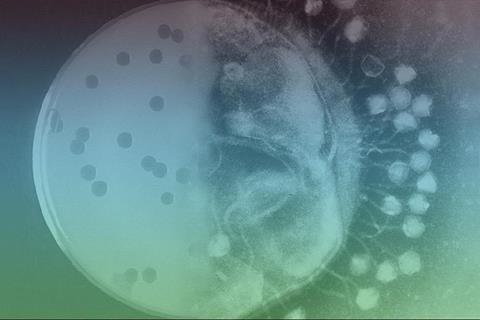In a major new report the UK’s Science, Innovation & Technology Committee has called for steps to develop the potential of bacteria-killing viruses - called bacteriophages or phages for short - that can provide an alternative to antibiotics that are attracting growing resistance.

The call follows Applied Microbiology International’s successful pitch to the UK Government to launch an inquiry to explore the regulatory barriers and opportunities for bacteriophage therapy in the UK, in order to explore their potential as an alternative or addition to conventional antimicrobial drugs.
Phages have been used as therapy for over a hundred years, but interest has increased in recent years as the widespread use of antibiotics is leading to alarming antimicrobial resistance (AMR) to even the most effective treatments. But they have never been licensed for therapeutic use in the UK. They have only been used as “compassionate” treatments of last resort in isolated cases of otherwise intractable infections.
One of the problems has been an impasse: in order to be deployed in clinical trials phages must be manufactured to the Good Manufacturing Practices (GMP) standard. But investment in compliant manufacturing plants will only be justified following successful clinical trials.
Lab under threat
Rt Hon Greg Clark MP, Chair of the Committee, said: “Phages offer a possible response to the increasing worldwide concerns about antimicrobial resistance.
“But the development of phage therapies is at an impasse, in which clinical trials need new advanced manufacturing plants, but investment requires clinical trails to have demonstrated efficacy.
“The Committee is asking the Government to consider whether the mothballed Rosalind Franklin Laboratory in the West Midlands could provide a suitable facility. The Laboratory, which has already received over £1 billion of public funding, was established by the Government to bring to an end the inadequacy of testing capacity that so hampered the national response to Covid. It consists of modern, secure laboratory facilities and was meant to be an important source of national resilience against future pandemics.
”But the Rosalind Franklin Laboratory has suddenly appeared for sale on the property website Rightmove, to the astonishment of the science and health communities. Our Committee’s report on phages asks for the Rosalind Franklin Laboratory to be considered for this purpose, rather than be lost to the nation and to science in a firesale.”
Shared facilities
The Committee recommends that the Government should consider establishing a small GMP facility on the lines of the Catapult network which provides shared facilities for companies who cannot afford to make the level of investment on their own.
The Committee also calls on the Medicines and Healthcare Products Regulatory Agency (MHRA), Department for Health and Social Care (DHSC), and phage researchers to work together to make for a more promising route for phage research to be funded and its products licensed for use.
The Committee calls for:
- Awareness-raising for healthcare students and professionals of the antimicrobial potential of phages where antibiotics have failed or are failing
- Government and its agencies to make a definitive and positive statement on the role of phages in the national approach to anti-microbial resistance (AMR), which is important in research funding decisions and for private investment in commercial phages
- The MHRA to consider allowing the compassionate use of non-GMP phages produced in the UK for last resort medical cases where other medical approaches have failed or are failing
- The MHRA to review how current regulations would govern liability for clinicians and hospitals who used UK non-GMP phages







No comments yet